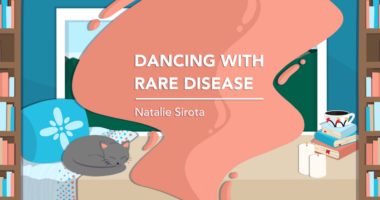
What I wish someone had told me about raising a child with HAE

David Letterman’s Top Ten List — a list of themed one-liners from the least to the most important — was a popular staple of his CBS late-night show. Whether it was James Earl Jones reciting words in his iconic, resonating voice or the Top Ten Rejected Song Lyrics sung with deep emotion by Lionel Richie, the lists were purposely more funny than informational.
As odd as it may sound, I often wish someone had provided our family with such a list after our daughter, whom we lovingly refer to as Ladybug, was diagnosed with hereditary angioedema (HAE). But instead of just one-sentence tips or information, there would be a brief explanation so I could have understood what lay ahead.
So, without further ado, here is today’s HAE Top 10 List: Things I Wish Someone Had Told Me About Raising a Child With HAE.

Danita’s daughter, whom she calls Ladybug, pictured here in a floral dress. (Photo courtesy of Danita LaShelle Jones)
10. An HAE diagnosis can lead to more waiting.
Sometimes the diagnosis becomes the easiest part. Finding the proper treatment can take some additional time and even create aggravation all on its own. Be patient, be vocal about what’s bothering you, and listen to the solutions your child’s medical team has to offer.
9. Keep a calendar dedicated to the flares.
Is your child experiencing HAE symptoms? Take a moment and log it on your phone’s calendar. This helps avoid frustrating conversations with emergency room medical staff about when it began and if you know what may have triggered it. It’s also a great way to monitor your child’s progress.
8. Your science teacher was right.
If you ever uttered “When will I need this in real life?” to your chemistry teacher, email them an apology. A basic knowledge of milliliters, knowing to gently handle vials, and how to keep solutions at specific temperatures all come in handy when administering medicine at home. Don’t worry — incredible medical teams are ready and willing to give you a refresher course.
7. Accept help when offered.
Did someone offer to send dinner? Accept it. Did someone tell you they could come by and clean your house? Say yes. Sometimes the best help comes from friends without any medical experience. They’re just willing to shoulder some of your everyday load.
6. Demand an alternative educational plan at your child’s school.
No matter how much they love their school, their teachers, or how great their grades are, insist on a 504 or an alternative educational plan for your child even if you may never activate it. It’s better to have the accommodations in place and not need them than to desperately need them and not have them.
5. Find a support group you can vent to.
As sympathetic as some of your friends, community, or family may be, caring for a child with HAE can be isolating. Find a support group, like the one at the Hereditary Angioedema Association, that completely understands what you’re going through. Sometimes what is most reassuring is talking to someone much older than your child who is managing their HAE very well.
4. Save all the phone numbers.
Depending on where you live or your type of insurance, you may be in constant contact with liaisons, nurses, medication advocates, and specialty pharmacies. Save their numbers like they are your personal friends. Make a list and put it on the refrigerator or in other visible places so that if someone has to step in, they know who to call.
3. Remember, kids are still kids.
No matter how much you try to drill it into their heads, there may be times your child will avoid telling you they need help because they want to “feel normal.” Don’t get upset with them. Gently remind them, as often as you can, that the sooner they tell you they don’t feel well, the better.
2. Don’t make HAE the center of your world.
The most challenging thing to do is not let your child’s illness take over everyone in the house’s life. Yes, sometimes schedules need to be adjusted, games may be missed, and you may be late for some dinner dates. Together, figure out a way to minimize interruptions for everyone. It’s easy for you or other people in the house to fade into the background when one child is the sole focus.
And the No. 1 thing I wish someone had told me about raising a child with HAE (drumroll please):
1. Take the “caregivercation.”
Infusions can be emotionally draining, hospital visits can make you feel defeated, and late nights after your child has a bad flare are exhausting. Whether you spend the weekend out of town or in a local hotel, or you retreat to a friend’s house to relax for several hours, identify a person who can watch your child for a while — or a weekend — and recharge your caregiving battery.
Even though there’s no thunderous applause at the end of our list, know that people in the HAE community, including me, are cheering you on.
Angioedema News is strictly a news and information website about the disease. It does not provide medical advice, diagnosis, or treatment. This content is not intended to be a substitute for professional medical advice, diagnosis, or treatment. Always seek the advice of your physician or other qualified health provider with any questions you may have regarding a medical condition. Never disregard professional medical advice or delay in seeking it because of something you have read on this website. The opinions expressed in this column are not those of Angioedema News or its parent company, Bionews, and are intended to spark discussion about issues pertaining to angioedema.
About the Author

Danita currently calls Madison, Alabama, home. She and her husband raise four exceptional children, one of which lives with hereditary angioedema — Ladybug. As a caregiver, Danita hopes that her column will show other caregivers and patients that they’re not alone. Championing the idea to “inform the world,” she seeks to reveal HAE in such a way that even if it’s rare for an individual to have it, it isn’t rare for everyone to know about it.
Recent Posts
- Having HAE takes toll on life quality, regardless of race, ethnicity
- Biocryst to present new Orladeyo, navenibart data at AAAAI meeting
- Real world study in Canada shows Takhzyro cuts HAE attacks by 80%
- Guest Voice: Why misconceptions about HAE are harmful
- Living with chronic illness changed my programming





